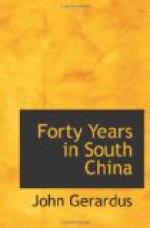“In reference to it, i.e., the report of the Committee on Foreign Missions, we would make three remarks: (1) It (Resolution III.) seems rather a cavalier answer to the fraternal wish of the Synod of the English Presbyterian Church, as expressed in their action. (2) The action of Synod is made to rest (Res. I.) on the fact that Synod had ‘tested’ this ’plan of conducting foreign missions.’ If this be so, and the plan had been found by experiment unobjectionable, the argument is not without force. But how and where has this test been applied and found so satisfactory? Our Church has three Missions among the heathen-one in India, one in China, and one in Japan. Has it been tested in Japan? No. They have not yet a single native church. Has it been tested in China? If so, the missionaries were not aware of it. The test applied there has been of an opposite character and has been wonderfully successful. The test has only been applied in India, and has only begun to be applied even there. There, as yet, there is but one native pastor. Their Classis is more American than Indian. We must wait until they have a native Classis before the test can be pronounced at all satisfactory. (3) No consideration is had for the feelings, wishes or opinions of the native churches. The inalienable rights of the native churches, their relation to each other, their absolute unity-things of the utmost consequence-are not at all regarded, are entirely ignored.”
In reply to the advantages claimed to flow from the plan advocated by General Synod, Mr. Talmage says:
“1. The most important advantage is, or is supposed to be, that there will thus be higher courts of jurisdiction to which appeals may be made, and by which orthodoxy and good order may be the better secured to the Church at Amoy.
“Such advantages, if they can be thus secured, we would by no means underrate. There sometimes are cases of appeal for which we need the highest court practicable-the collective wisdom of the Church, so far as it can be obtained; and the preservation of orthodoxy and good order is of the first importance. Now, let us see whether the plan proposed will secure these advantages. Let us suppose that one of the brethren feels himself aggrieved by the decision of the Classis of Amoy and appeals to the Particular Synod of Albany, and thence to General Synod. He will not be denied the right to such appeal. But, in order that the appeal may be properly prosecuted and disposed of, the appellant and the representative of Classis should be present in these higher courts. Can this be secured? Is the waste of time, of a year or more, nothing? And where shall the thousands of dollars of necessary expense come from? Now, suppose this appellant to be a Chinese brother. He, also, has rights; but how, on this plan, can he possibly obtain them? Suppose that the money be raised for him and he is permitted to stand on the floor of Synod. He cannot speak, read, or write




